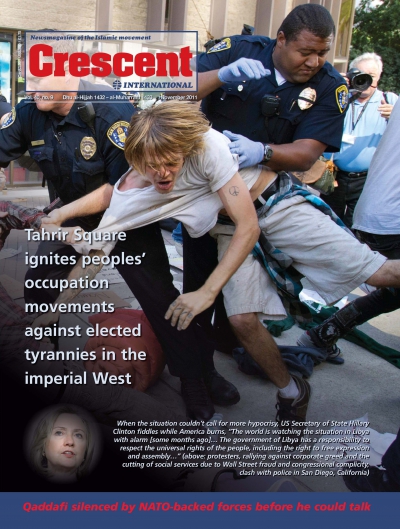Crescent International Vol. 40, No. 9
Newsmagazine of the Islamic movement
Zafar Bangash, Afeef Khan, Muhammad H. al-'Asi
Dhu al-Hijjah, 1432 2011-11


Perhaps the most comforting thing in a revolution, in the midst of angst, bloodshed, and existential fear, is food. Steaming hot victuals, nourishing a tired body; the pleasure of breaking bread with compatriots in arms, cementing the fellowship you have formed under the hail of bullets, police batons, and clouds of tear gas.

It is an open question whether the Occupy Wall Street Movement will achieve its objectives. Launched on September 17, it has not only lasted much longer than most observers had anticipated, it has also gone global. On October 15, there were rallies in 82 countries worldwide from east to west and north to south.

News of Shaikh Hassan’s deteriorating health came from a government appointed prison physician who said his cancer had returned.

Hamas, the Islamic resistance movement that heads the government in Ghazzah, has scored a stunning victory over the Zionist State of Israel. It is not merely the numbers: 1,027 Palestinian prisoners in exchange for one Israeli soldier.

Barack Obama’s announcement on October 21 that US troops would be withdrawn from Iraq by the end of the year might have been regarded as a masterpiece of political spin, except that very few people were fooled.

It is that time of the year again. Muslims from far and near prepare themselves for the lifelong journey to Ibrahim’s (a) final destination, to the emigre home of Hajar, to the life-threatened birth of Isma‘il (a), to the expatriate city of Muhammad (pbuh) and to the cradle of Islam — to Makkah al-Mukarramah.

With prospects of assuming power looking brighter in the aftermath of the Islamic Awakening sweeping the region, Islamic activists are engaged in a debate about the future political order in the Muslim East. There is near consensus that Islamic parties enjoy broad support, are well organized and will do well whenever elections are held.

The drama of the Irvine 11 came to a close in an exercise of farce on 9-23-2011. Eleven Muslim students were tried in a Santa Ana, California court for heckling Israeli Ambassador Michael Oren during a February 2010 event at the University of California, Irvine.

One thing has become clear as a result of the movements for dignity and freedom sweeping the Muslim East (aka the Middle East): the old order has been permanently and irrevocably altered.
our Eurasia affairs correspondent
Dhu al-Hijjah 05, 1432
News & Analysis

Muslim states and many Islamic movements fail to distinguish between the erstwhile USSR and today’s Russia due to the deep-seated association of Russia with the Soviet Union. Similarly, many Muslims have not taken into account that today’s Russia does not seek to be a global power because it has accepted the dominant Western global order.

How tight are US-Saudi relations? Here is a clue. While former US President George Bush would publicly hold hands with King Abdullah of Saudi Arabia and even touch noses like birds before mating, his successor Barack Obama also made his first overseas trip to Saudi Arabia before he landed in Cairo for his now-forgotten speech delivered on June 4, 2009.

The Islamic party, al-Nahda, was the clear winner out of a crowded field of some 100 parties but it did not gain an absolute majority because of the way the electoral process was structured. Even so, party leaders were at pains to assure the secularists — and indeed the West — that al-Nahda had no plans to establish an Islamic state.

Unease and concerns have escalated among political activists in Egypt following announcement by two top generals that the ruling Supreme Council of the Armed Forces (SCAF) intends to remain in firm control even after election of the People’s Assembly.

Only the demented minds of American officials could concoct a story of the alleged plot to kill the Saudi ambassador to Washington, Adel al-Jubeir. In making this scandalous allegation on October 11, US Attorney General Eric Holder and FBI Director Robert Mueller looked shifty and visibly uncomfortable.
